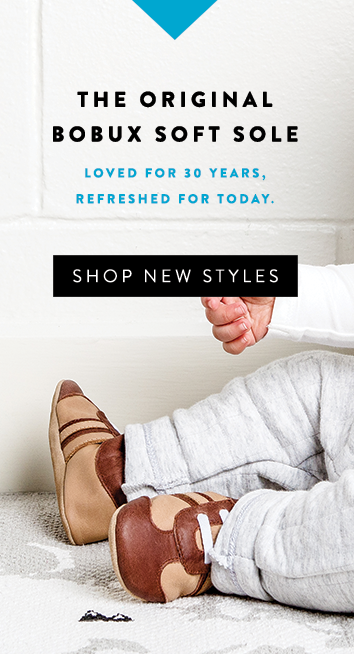This website requires cookies to provide all of its features. For more information on what data is contained in the cookies, please see our Privacy Policy.
hello!
or
Stay here
![Labelling Shoes for Boys and Girls: Is It Sexist? [Guest Post]](https://www.bobux.com/media/mageplaza/blog/post/0/8/082f20d066153ff9702e3ee46eb45b5c.jpg)
Simon
Ragoonanan is a stay-at-home dad. He’s also founder of
Man vs Pink, a blog that rails against gender
divisions. In this post, he raises some interesting questions about whether we
should be splitting our kids’ shoes into gender categories…
One of the first pairs of shoes we bought
for our daughter when we were living in New Zealand were a pair of
Bobux First Walkers. The children's
shop we got them from didn't have boy or girl sections for its clothes, toys or
shoes and we chose a blue pair.
Some months later, after we had moved back
to the UK, it came time to buy her some new ones. At the local shoe shop we
again selected a blue pair. An assistant, seeing our selection, said something
very odd.
"There's a problem with these shoes," she rather gravely said. "They're boys’ shoes."
There are a dozen things I now wish I had
said to her, but all I did was politely reply that we didn’t mind and we bought
them.
What defines girls’ shoes or boys’ shoes?
An easy answer is: whoever’s wearing it.
But what if it is the same type of shoe
worn by the boy and girl? Should it be labelled a boys’ shoe or a girls’ shoe
by retailers? How different are boys and girls that they need different shoes? That’s
where questions of sexism come into it.

Do We Really Need Gender-Specific Shoes?
Gender division has no logical place in children's shoes. Kids feet are as similar or different among boys and girls as each other. The developmental requirements of a shoe for a child are the same, whether they are a boy or girl. Any gender division around style or colour is imposed by us, not by nature.
Bobux have a great range of intelligently
and creatively designed shoes for children. But the Bobux online store, like
many retailers, classify their shoes as either Boys or Girls. Bobux say they do
this because this is the way their customers prefer to shop.
There's a chicken & egg scenario here.
Are retailers simply responding to the way consumers want to shop? Or do
consumers shop this way because retailers label shoes by gender?
There's no simple answer to that. But what
I do know is this: If you're a parent choosing shoes for your child, and only
looking at gender-specific styles, you're missing lots of potentially great
options that they - and you - might prefer.
A good example is the Bobux Outback style,
in the
Toddler &
Preschoolers section. There are seven colour options in total, but if you
select either Boy or Girl you will only see some of them.

The way these colours have been split by
gender is curious, as it's not a simple clichéd pink/blue divide. The striking
Gold and Silver options are under Girls only, while the Blue, Black, and Espresso
(dark brown) options are deemed Boys. Red and Toffee (light brown) colours are
visible under either category. And to reiterate, these are the same style of
shoe - simply in different colours.
I know there are plenty of little girls who
would happily wear blue, black or dark brown shoes (and they have to at
school). Equally, while a more flamboyant option, boys would rock a pair of
gold or silver shoes as much as any girl.
Of course parents can (and often do) ignore
the gender categories. But because these labels are so prominent, many parents
don't and simply browse the one that applies to their child. At least Bobux
have provided a handy ALL category right next to the Boy/Girl filters.
Why Does It Matter So Much?
You may feel accusations of sexism are an
overreaction. But the gender split in children's shoes - and other aspects of
their lives - becomes even more pronounced as children grow older. They become
increasingly aware that
this is
considered girly, while
that is
thought to be boys only. At primary school, this boy/girl divide can become
fixed within the child, with all kinds of ramifications for their future.
One day a child is labelling a pair of
shoes being for boys or girls only - tomorrow it could be an interest, a school
subject, or an activity. Eventually, a child could identify future careers as
either for boys or girls. These small instances of sexism can easily snowball
into something with lasting negative results.
So when it comes to buying shoes for your
child, why limit yourself? More importantly, why limit your son or daughter?
Break out of the false gender split when it comes to shoes, because boys and
girls have far more in common with each other than dividing them.
There are differences between boys and
girls, but their feet isn't one of them.
Do you agree with Simon? Here at Bobux, we also think it's important to challenge gender stereotypes. And while it can sometimes be tricky providing the right separate searches for Girls and Boys (which we keep, because it's how many of our customers like to shop), we try our best to provide a diverse range of colours and styles for boys and girls, by including, for example, Vogue Blossom and Vogue Silver soft soles in our newborn boys category.
We’d love to hear your thoughts in the comments section below! Otherwise, shop our range of Bobux shoes for all genders today to find something that little bit different for your child.




















